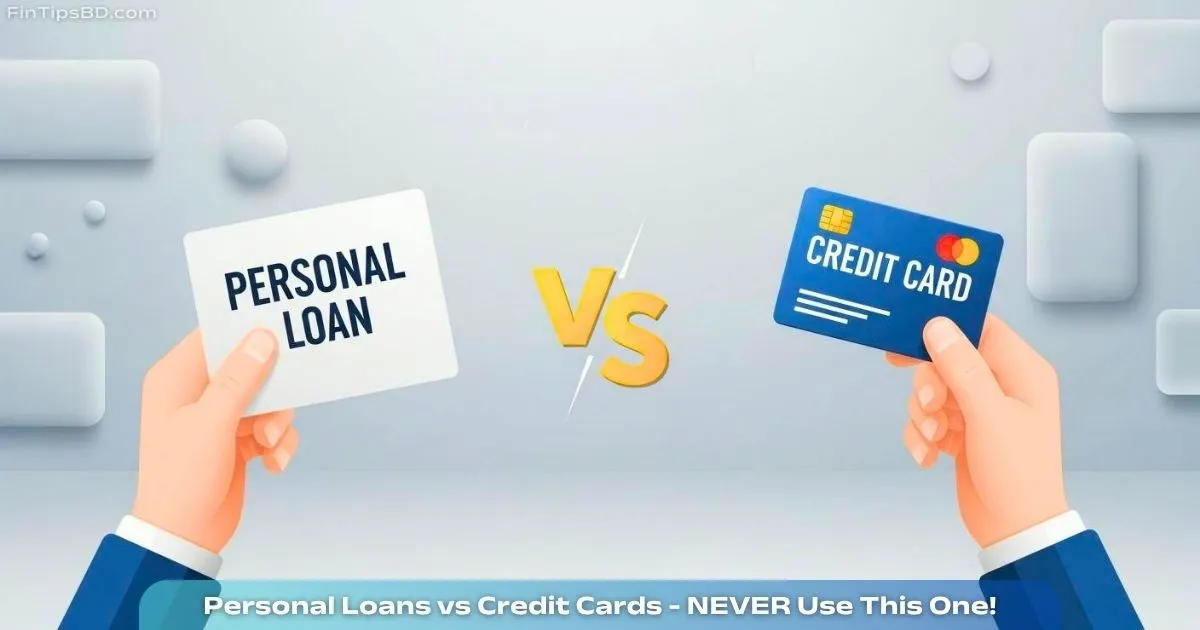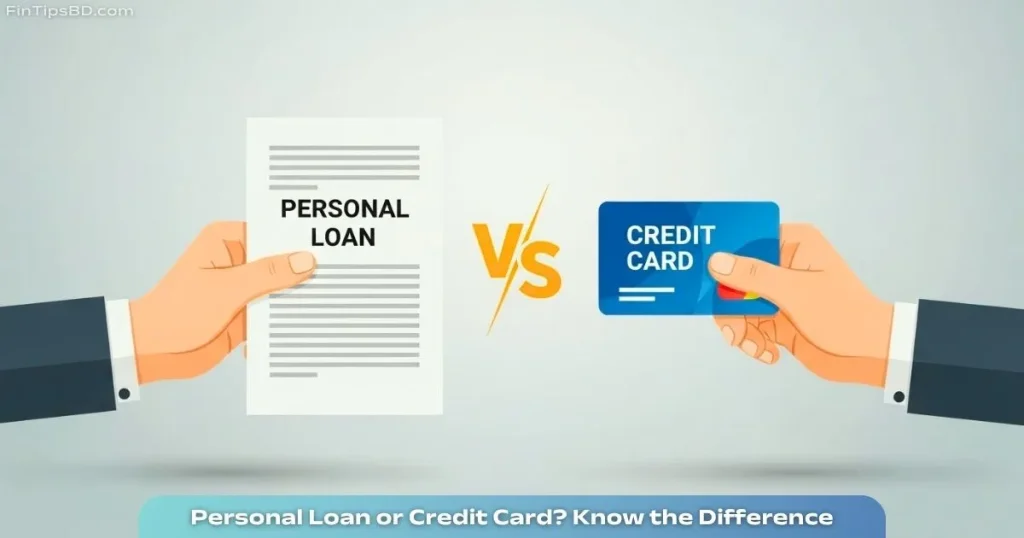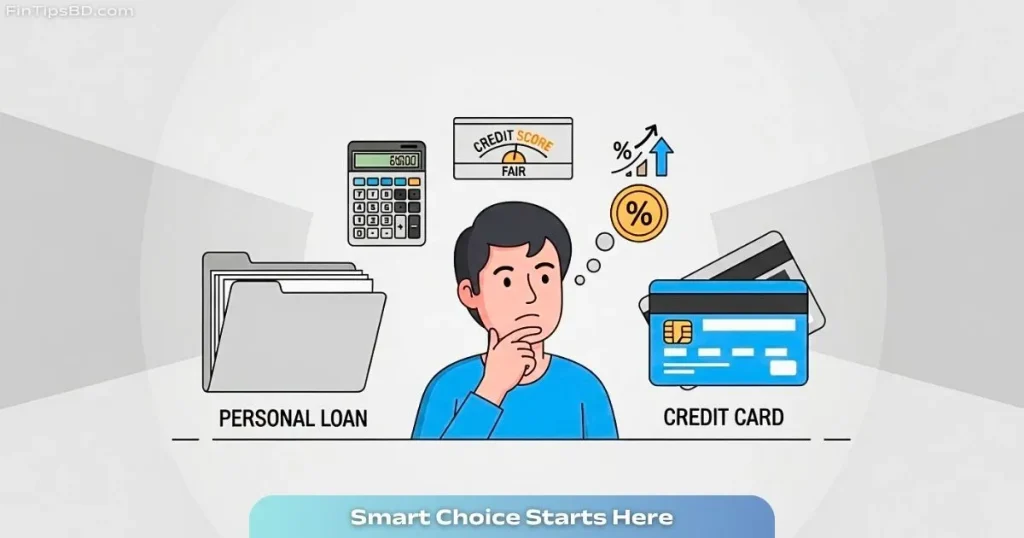Personal Loans vs Credit Cards – The One You Should NEVER Use (Revealed)

When it comes to borrowing cash, the showdown between personal loans vs credit cards is more than just money talk—it’s a decision that can shape your whole financial path. Whether you’re aiming to tackle debt, handle an urgent cost, or fund a big buy, the choice you make matters a lot. This piece explains not just the upsides and downsides of each option, but also why using one recklessly could really hurt your financial future.
Table Of Contents
What Are Personal Loans?
A personal loan is a set sum of money you get from a bank, credit union, or online lender. Unlike the ongoing borrowing of revolving credit, a personal loan is an installment loan, meaning you get a single chunk of cash upfront and pay it back over a fixed time—usually 2 to 5 years—with interest. The personal loan interest rate can be fixed or variable, based on your credit score and the lender’s rules. A fixed interest rate keeps your monthly payment steady, giving you certainty, while a variable interest rate can shift with market trends.
Most folks take out personal loans to merge high-interest credit card debt, cover big medical costs, or pay for home upgrades. The main perk here is knowing what’s coming—you know exactly how much you’ll pay each month and when you’ll be free of debt.
Example: Say you borrow $10,000 at a 9% interest rate over 3 years. Your monthly payments stay the same, and once the term is up, you’re finished. This clear end date is a big plus.
What Are Credit Cards?
A credit card gives you access to a reusable line of credit—basically, a borrowing cap you can use again and again. You can borrow up to that cap, pay it back, and borrow more. Credit cards are often used for daily buys, emergency expenses, or booking trips.
The downside? If you don’t clear the full balance each month, interest piles up fast. In fact, the average credit card APR (Annual Percentage Rate) is much higher than the interest on most personal loans, often ranging from 15% to 25% or even more.
Credit cards also offer extras like cashback, travel perks, and fraud protection—but those bonuses don’t mean much if you’re stuck paying 20% interest on a revolving balance. Keeping your credit utilization (the amount of credit you’re using compared to your total limit) in check is vital for both your financial health and your credit score.
Personal Loans vs Credit Cards: A Clear Comparison

Let’s dig into how personal loans vs credit cards stack up when you look at the details side by side. Knowing these differences is crucial for making smart choices among the many borrowing options out there.
| Feature | Personal Loans | Credit Cards |
|---|---|---|
| Type of Credit | Installment loan | Revolving credit |
| Interest Rates | Typically lower (6–12%) | Higher (15–25% on average) |
| Repayment Structure | Fixed monthly payments | Minimum monthly payments |
| Ideal For | One-time large expenses | Small, short-term needs |
| Credit Score Impact | Helps if paid consistently | Risky if balance stays high |
| Flexibility | Less flexible | Very flexible |
This table highlights how different these borrowing tools really are.
Pros and Cons of Personal Loans
Pros:
- Lower interest rates than most credit cards, especially for those with solid credit. This can save you a lot over the loan’s life.
- Fixed repayment plan gives you a clear debt-free date, making budgeting easier and offering a set end point to your debt.
- Great for debt consolidation, helping you streamline your finances by combining multiple debts into one, often cheaper payment.
- Steady monthly payments make it simpler to plan your budget.
Cons:
- May include upfront fees (like an origination fee taken from the loan amount) or penalties for paying early, though not every lender charges these.
- Getting approved is tougher if your credit score is weak, as lenders usually want a decent credit history.
- Not great for ongoing or changing expenses, since you get a lump sum and then repay it.
Pros and Cons of Credit Cards
Pros:
- Handy for everyday buys or emergencies, giving you instant access to cash.
- Offers rewards, cashback, and travel perks, which can add value if you clear your balance every month.
- Can boost your credit score if used wisely and paid on time, showing good credit habits.
- Provides a grace period on new purchases, usually 20-25 days, where you avoid interest if you pay your balance in full.
Cons:
- High-interest rates can lock you in a debt spiral, especially if you only make minimum payments.
- Easy to overspend with revolving credit, piling up debt quickly.
- The minimum payment trap can stretch debt out for years, costing you way more in interest than the original purchase.
- Misusing a credit card can harm your credit score and credit utilization.
When Should You Use a Personal Loan?
A personal loan is often the better pick when:
- You need a set amount for a specific reason (like a wedding, car fix, or major home project). These are usually one-time, bigger costs.
- You’re combining high-interest credit card debt into one loan with a lower rate. This can simplify your payments and cut interest costs.
- You want a clear repayment plan and a definite end date, giving you financial peace of mind.
If you qualify for a low personal loan interest rate, it could save you hundreds—or even thousands—compared to carrying a credit card balance. It offers a clear path to being debt-free.
When Should You Use a Credit Card?
Credit cards can work well if:
- You can pay the full balance every month without fail. This lets you enjoy the perks without racking up interest.
- You want to earn rewards on purchases you’d make anyway, basically getting a discount or bonus for your regular spending.
- You’re handling short-term costs and have the cash to cover them, but need quick access or prefer using a card.
Using a credit card for daily expenses or a small emergency can be helpful, but only if you’re disciplined enough to avoid carrying a balance. They’re great tools for building credit history when used carefully.
Personal Loans vs Credit Cards – The One You Should Avoid (If You’re Not Careful)
Here’s the plain truth: if you’re not good with money, steer clear of credit cards.
Why? Because credit cards come with high-interest rates, and if you get caught making only the minimum monthly payment, you could be in debt for years—paying way more than what you borrowed. This is where revolving credit can become a big drawback.
Example:
You charge $5,000 to a credit card with a 20% credit card APR and only make minimum payments. It could take over 15 years to clear, and you’ll end up paying more than $10,000 total.
That’s not just costly—it’s a financial disaster. The lack of a set payoff date for minimum payments can lead to endless debt.
On the flip side, a personal loan locks you into a repayment plan that ends. No minimum payment trap. No revolving balance. Just a simple installment loan with a due date. This setup can be a game-changer for those who struggle with spending control.
How to Choose Wisely: Practical Tips

When thinking about your borrowing options, it’s key to look at your own financial habits and situation.
- Figure out your goal – Is this a one-time cost or something ongoing? Your answer will guide your choice between personal loans vs credit cards.
- Compare interest rates – The personal loan interest rate vs credit card APR makes a big difference in your total borrowing cost. Always check rates from different lenders.
- Crunch the numbers – Use a loan calculator to compare total repayment costs for both options. Don’t just focus on the monthly payment; look at the full cost over time.
- Know your habits – If you’re likely to overspend, a personal loan might keep you on track with its fixed setup. If you’re careful, a credit card can offer rewards and ease.
- Monitor your credit score – Both options affect it, but misusing credit cards, especially by keeping high balances and hurting your credit utilization, can do faster and worse damage. Steady, on-time payments, whether for an installment loan or revolving credit, are key to a strong score.
Final Thoughts: Personal Finance Is About Control, Not Ease
In the matchup of personal loans vs credit cards, both tools have a role in a solid financial plan. But picking the right one depends on how you use them. If you’re careful and disciplined, either can help you reach your money goals. But mess up with a credit card, and you’re facing a long road of interest, stress, and regret.
If you’re unsure, go with the safer bet. A personal loan offers structure, giving you a clear way out of debt with a predictable personal loan interest rate. A credit card tempts with flexibility, but that freedom comes with a higher credit card APR and the risk of the minimum payment trap. When it comes to your cash, structure often beats out convenience, especially for bigger, planned expenses or debt consolidation.
